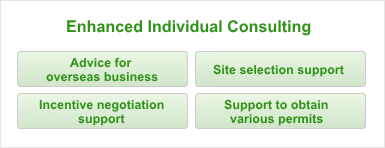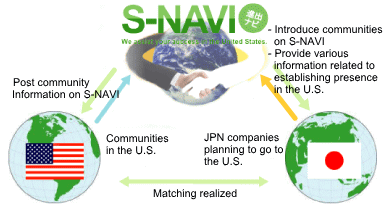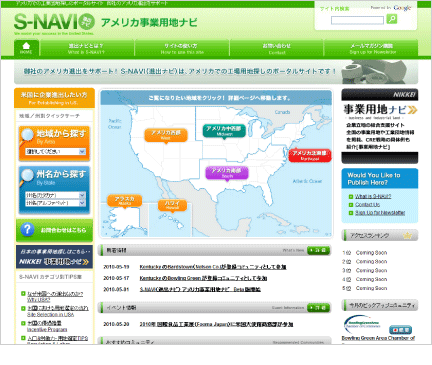

It has been almost 40 years since Japanese companies started developing
their business in the United Sates. Now there are more than 2,000 Japanese
companies that own plants in the U.S. The influx of Japanese companies
and other overseas companies to the U.S. keeps growing, which shows the
importance of the Untied States that is the country of great consumption.
On the other hand, it is the reality that many Japanese companies still
think that it is difficult to do business in the U. S. compared to Asian
countries. The United Sates, since it is such a large county, has different
laws, different cultures and customs in different areas. Their climate
and topology are varied depending on the regions. And the Japanese people
may feel that it is difficult for them, who have very different cultures,
to get in and blend in in the U. S. However, many American towns enjoy
the economical effects such as employment and tax benefit that overseas
companies have brought to the areas and they are actively inviting more
foreign companies to locate to their communities.
As one of the Japanese who have long worked in the U.S, I wanted to help
lower the psychological hurdle between Japanese companies and various communities
in the U.S. for their smooth and successful business development in the
U.S, and that is why we started this new service S-NAVI. We have great
project experience with Japanese companies in the U.S. and tried to incorporate
our finding in the service. Our goal is to become a matchmaker, and for
Japanese companies who are planning to develop their business in the U.S,
and various U.S. local area entities such as chamber of commerce, economic
development agencies, etc. to deepen their relationships through this website.
Explanation in Japanese
New York, Los Angeles and Chicago are large cities that Japanese people
are familiar with, but most of the towns where overseas companies including
Japanese companies are located are mid/small-size towns that Japanese people
may have never heard of before. It is not an easy task to find the best
area that best meets the needs of any given company out of numerous towns
scattered across such a large country. To start business in the U.S. doesn't
mean just building a plant, but also starting a new long-term relationship
with the community. Without having a close tie in the area in terms of
employment, education, and various other aspects, successful business development
will not be achieved.
For that purpose too, it is extremely important to study each community
before deciding where you want to build your plant. Our S-NAVI, from that
perspective, introduces many communities who are actively inviting new
business. We are planning to add more introduction pages of these communities
in Japanese.
![[What is Community?] In the elections in the United States, creating jobs has been one of the critical issues. Therefore, attracting business is enforced sometimes in federal or state level, but it is basically done municipally. Local government, especially economic development agencies and chamber of commerce, etc. go over and beyond to provide incentive packages such as site development, tax, infrastructures, etc. to invite new business. Sometimes they form a professional organization such as Economic Development Fund, etc. On this page, we generally call these local entities that attract business Communities.](./img/intro_img03.gif)
![[See TIPS by Category for the Important Points to be Noted for Site Selection] Upon site selection in the United States, it is essential to have expertise on site selection in the U.S. in addition to criteria observed in Japan. TIPS by Category provides a wealth of information such as the flow of site selection, unique laws and regulations in the decentralized U.S. ? very useful basic information for companies who are planning projects in the United States.](./img/intro_img04.gif)
Local community's active business invitations for Sharp's plant in Kameyama City in Mie and Sakai City in Osaka, Japan are well known. In the United States, it is a standard procedure that each state or local government prepare attractive incentive packages to attract business to their own communities. Especially in environment focused projects, as a measure to re-boost the economy under the Obama administration, even overseas companies have been entitled for a large amount of subsidy and low interest financing plans and have taken advantage of them for their projects in the U.S. Siemens, a German company is undertaking a large-scale wind mill assembly project in Kansas, but this is a good example of utilizing the preferential treatment and subsidy. I am a Japanese and I am hoping that Japanese companies will capture great opportunities like this for their business development in the U.S.
"S-NAVI" provides critical information on site selection in the U.S. for Japanese companies, such environmental concerns, and logistics. Moreover, Gray Partners, Inc. that operates S-NAVI also offers individual consulting work regarding developing business in the U.S. Please let us help you with your plan to go overseas, including the Untied States.










